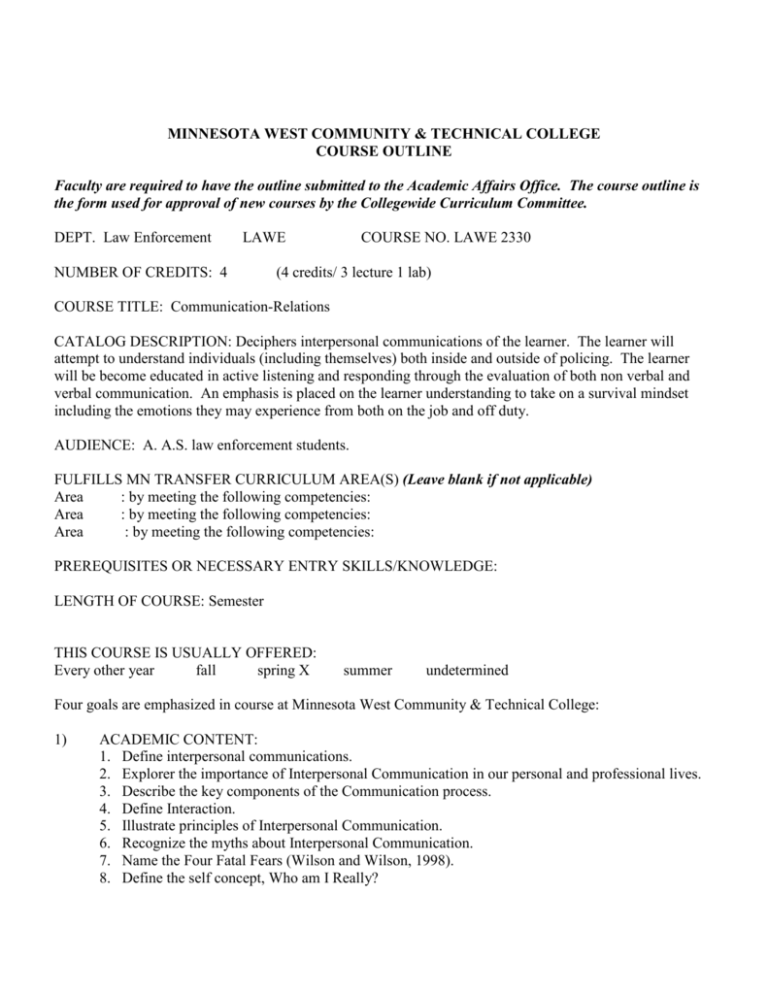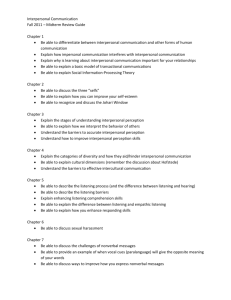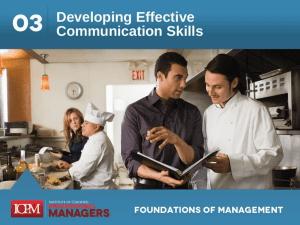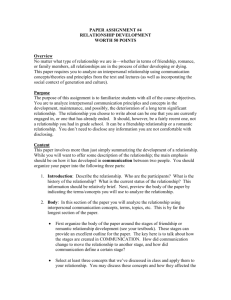MINNESOTA WEST COMMUNITY & TECHNICAL COLLEGE
advertisement

MINNESOTA WEST COMMUNITY & TECHNICAL COLLEGE COURSE OUTLINE Faculty are required to have the outline submitted to the Academic Affairs Office. The course outline is the form used for approval of new courses by the Collegewide Curriculum Committee. DEPT. Law Enforcement LAWE NUMBER OF CREDITS: 4 COURSE NO. LAWE 2330 (4 credits/ 3 lecture 1 lab) COURSE TITLE: Communication-Relations CATALOG DESCRIPTION: Deciphers interpersonal communications of the learner. The learner will attempt to understand individuals (including themselves) both inside and outside of policing. The learner will be become educated in active listening and responding through the evaluation of both non verbal and verbal communication. An emphasis is placed on the learner understanding to take on a survival mindset including the emotions they may experience from both on the job and off duty. AUDIENCE: A. A.S. law enforcement students. FULFILLS MN TRANSFER CURRICULUM AREA(S) (Leave blank if not applicable) Area : by meeting the following competencies: Area : by meeting the following competencies: Area : by meeting the following competencies: PREREQUISITES OR NECESSARY ENTRY SKILLS/KNOWLEDGE: LENGTH OF COURSE: Semester THIS COURSE IS USUALLY OFFERED: Every other year fall spring X summer undetermined Four goals are emphasized in course at Minnesota West Community & Technical College: 1) ACADEMIC CONTENT: 1. Define interpersonal communications. 2. Explorer the importance of Interpersonal Communication in our personal and professional lives. 3. Describe the key components of the Communication process. 4. Define Interaction. 5. Illustrate principles of Interpersonal Communication. 6. Recognize the myths about Interpersonal Communication. 7. Name the Four Fatal Fears (Wilson and Wilson, 1998). 8. Define the self concept, Who am I Really? 9. Define self esteem. Where have I been and where am I going? 10. Understand personality type and Awareness (Meyers, Briggs/Keirsey Temperaments/True Color). 11. Examine and compare and describe Individual Personality Types. 12. Identify how self concept and self esteem affect Interpersonal Communication in law enforcement. 13. Define self disclosure and linking yourself to others. 14. Explore the characteristics of self disclosure. 15. Define and explore Interpersonal Perception. 16. Define the relationship between Interpersonal Communication and Perception. 17. Explore how we perceive others. 18. Identify Perception barriers. 19. Improve individual Perception Skills. 20. Define cultural communication. 21. Define cultural differences and similarities. 22. Describe barriers that inhibit effective intercultural communication. 23. Improve intercultural competence. 24. Discover Interpersonal Relationships at home and work. 25. Demonstrate effective listening to What did you say? 26. Identify and investigate Style of listening. 27. Demonstrate strategies for improving listening and responding techniques. 28. Define and develop active listening in law enforcement. 29. Differentiate differences empathy and sympathy. 30. Discuss and develop empathetic listening and responding techniques. 31. Discuss and develop critical listening and responding techniques. 32. Model levels of communication (Covey, 1989). 33. Define verbal communication, What do words mean? 34. Understand the power of our words with individual accountability. 35. Understand how to use words. 36. Understand word barriers and what to avoid. 37. Discuss and incorporate supportive approaches to relate to others. 38. Discuss and experiment with “I” message (types). 39. Define conflict. 40. Define the stages of conflict. 41. Discuss and apply interpersonal management styles. 42. Define assertiveness in law enforcement. 43. Define anger management. 44. Discuss and scrutinize individual anger management techniques. 45. Define relationships as systems. 46. Define and discuss relationships of choice and relationships of circumstances. 47. Analyze relational development and the importance of trust and self disclosure. 48. Describe patterns and types of power in relationships. 49. Define, discuss, and develop stages of relational escalation and de escalation. 50. Investigate interpersonal development theories. 51. Define relationships techniques. 52. Discuss relationships and change. 53. Examine individual approach to change (How moved my cheese Johnson, 1998) recommended reading. 54. Discuss and experiment with strategies for maintaining relationships (Home and Work). 55. Discuss and experiment with individual strategies. 56. Define the four types of families. 57. Discuss and compare the characteristics of a healthy family. 58. Examine mutual problem solving. 59. Describe negotiation for entry level officers. 60. Discuss the idealistic rookie vs. the cynical veterans. 61. Define and discuss emotional and physical changes of a peace officer. 62. Explain officer survival that won’t happen to us. 63. Define denial. 64. Discuss typical officer reaction to change. 65. Discuss officer’s perspective defining cynicism. 66. Analyze cynicism in law enforcement. 67. Define hypervigilance. 68. Discuss the biology of hypervigilance. 69. Define the hypervigilance biological rollercoaster. 70. Discuss the effects of hypervigilance. 71. Discuss symptoms of the hypervigilance rollercoaster. 72. Describe and examine citizen view of policy hypervigilance (personal expenses). 73. Define and discuss the officer as the victim. 74. Discuss and apply victim based thinking. 75. Define control singular identity. 76. Explain the blame game. 77. Define and analyze entitlement. 78. Discuss loyalty vs. integrity situational ethics. 79. Highlight egoism/egotism. 80. Discuss and apply stop challenge choose. 2) THINKING SKILLS: 1. Analyzing and discussing in detail topics related to the law enforcement profession. 2. Implementing scenario based training to enhance the students understanding of the need for problem solving and crisis intervention skills. 3. Understand the many required reports that need to be completed and when they need to be done. 3) COMMUNICATION SKILLS: 1. Written exercises and assignments 2. Class discussions about topic areas 4) HUMAN DIVERSITY: 1. This course will help students recognize, understand, and appreciate human diversity through the use of authentic materials and discussing the historical implications that can be barriers to effective law enforcement service delivery in crisis situations. TOPICS TO BE COVERED: 1. This course is designed to meet the State of Minnesota Peace Officer Standards and Training Board (P.O.S.T.) minimum requirements for licensure. 2. Self evaluation. 3. Areas of interpersonal communication. 4. How to communicate. 5. The importance of active listening and response. LIST OF EXPECTED COURSE OUTCOMES: 1. Gain knowledge that will be useful and necessary for law enforcement careers. 2. Gain an understanding of who they currently are and how work and home can affect them. 3. To gain an understanding of conflict and how to recognize it when it appears. 4. Gain an understanding of relationships. 5. Understand the differences between ethics and integrity. LEARNING/TEACHING TECHNIQUES used in the course are: Collaborative Learning Problem Solving Student Presentations Interactive Lectures Creative Projects Individual Coaching Lecture Films/Videos/Slides Demonstrations Other (describe below) Lab ASSIGNMENTS AND ASSESSMENTS FOR THIS CLASS INCLUDE: Reading Tests Individual Projects Oral Presentations Worksheets Collaborative Projects Textbook Problems Papers Portfolio Group Problems Term Paper Other (describe below) EXPECTED STUDENT LEARNING OUTCOMES: 1. Demonstrate the proper way to affect an arrest of an impaired driver. 2. Demonstrate an understanding of Minnesota State Statutes chapters 168, 169, 169A, 171… 3. Demonstrate an ability to perform traffic stops. The information in this course outline is subject to revision Veteran Services: Minnesota West is dedicated to assisting veterans and eligible family members in achieving their educational goals efficiently. Active duty and reserve/guard military members should advise their instructor of all regularly scheduled military appointments and duties that conflict with scheduled course requirements. Instructors will make every effort to work with the student to identify adjusted timelines. If you are a veteran, please contact the Minnesota West Veterans Service Office. To receive reasonable accommodations for a documented disability, please contact the campus Student Services Advisor or campus Disability Coordinator as arrangements must be made in advance. In addition, students are encouraged to notify their instructor. This document is available in alternative formats to individuals with disabilities by contacting the Student Services Advisor or by calling 800-658-2330 or via your preferred Telecommunications Relay Service. A Member of the Minnesota State Colleges and Universities System An Affirmative Action Equal Opportunity Educator/Employer






